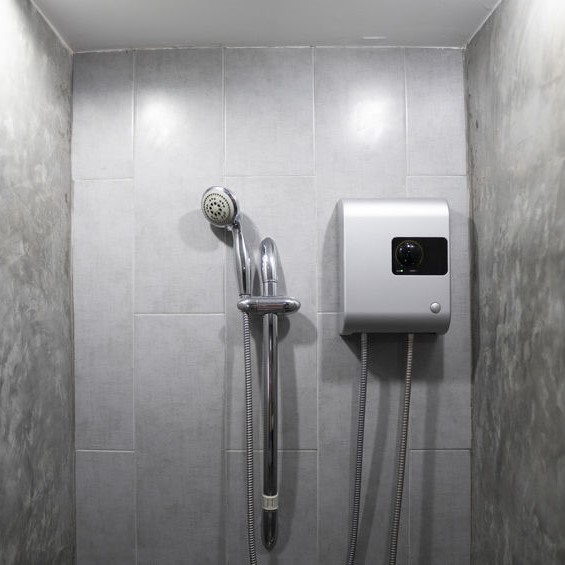WHAT IS A TANKLESS WATER HEATER?
When the water heater goes out, it is often at the most inopportune time, like first thing in the morning when you’re in the shower. Or perhaps your current water tank isn’t big enough for your household. Before that happens to you (again?), consider going with a tankless water heater for your next one.
A tankless water heater, or on-demand, instantaneous water heater, provides hot water only when you need it instead of producing hot water with standby energy in a storage tank like traditional water heaters. In our article here, we are going to answer common questions about this new way of having hot water in homes.
Can you run out of hot water with a tankless water heater?
With a tankless water heater system, it heats the water on demand, as you need it; therefore, it never runs out of hot water. Once you know how a tankless water heater works, you’ll agree that a tankless water heater makes sense.
With a traditional water heater system, the large tank holds water it has heated. When you turn on the hot water faucet, the tank has kept the water continually heated. That energy used to keep that water heated is known as standby heat loss.
A tankless water heater systems avoid that standby heat loss by heating water only on demand, i.e., when you turn on a faucet. Because you will no longer have that standby heat loss, the tankless water heater system is more energy-efficient.
What size tankless hot water heater do I need?
Before you purchase a tankless water heater, you need to calculate what size, which takes a little calculating based on the quantity and type of appliances and fixtures that use hot water. These facts will determine the Gallons Per Minute (GPM) and are defined as follows:
- Step One: Add up the flow rate of each fixture that uses hot water, considering the gallons per sixty seconds. You can find this information in owners’ manuals that comes with each appliance and fixture.
- Step Two: Next, consider the amount of water that will need to be warmed to reach the degree of “hot” desired, typically is 120 degrees Fahrenheit. Determine the average groundwater temp for the region you live and subtract the groundwater temperature from the hot water temperature you want will help you choose the right size of a tankless water heater.
- Step Three: The next step is knowing the power source you’ll be using. An electric tankless water heater is typically better for a home with less hot water demand and performs better in warmer climates. If your home has a large amount of hot water demand, gas is the better option.
Can I install a tankless water heater myself?
A tankless water heater installation is not a simple DIY project and shouldn’t be attempted by a newbie homeowner that has never worked with an electrical or plumbing matter before. There are plenty of online videos, and some big box home improvement stores have in-store classes. If you are still interested in attempting tankless water heater installation yourself, here are some facts that you need to know:
- Not every water heater system can be converted, which is something a professional plumber will know before you spend hundreds of dollars on a tankless water heater unit.
- Determine the size of the tankless water heater you need is determined by the appliances and faucets that will require hot water and how much you require hot water.
- A tankless water heater comes without any of the required fittings and pipes. Specific tools are needed to do the installation, which a licensed plumber will have already.
- The water will need to be turned off at the main. The current water heater will need to be drained and disconnected.
- The electricity or gas power will need to be turned off.
- The current water tank needs to be removed and disposed of safely and adequately.
- A new vent will need to be installed for the tankless water heater, which will need to be wired to the electricity, requiring the services of a licensed electrician.
- The new tankless water heater will need to be wired into the power.
- If the tankless water heater is gas-powered, new gas lines will need to be installed to accommodate the new tank, which requires welding.
- New water lines will need to run and installed, including the pressure relief valve and discharge line, which may require soldering.
Make sure you have checked all building codes and permits. Confirm your homeowner’s insurance coverage just in case something goes wrong. A certified and licensed plumber will have proper insurance, pull any require building permits, and follow all building codes.
Is a tankless water heater worth it?
A tankless water heater is more expensive to install than a traditional tank water heater, but the ROI comes with the amount you save on energy expenses. While an electric tankless water heater saves just over $40 annually, a gas-powered unit saves over $100 annually.

WHAT ARE THE ADVANTAGES AND DISADVANTAGES OF A TANKLESS WATER HEATER?
When comparing between tank vs. tankless water heater, look at the following pros to having a tankless water heater:
- Pro: Instant Hot Water – once the cold water has flushed through the pipes and faucet, your tankless water heater will provide you an immediate and endless stream of hot water.
- Pro: Tankless water heater has a longer lifespan than the traditional water heater.
- Pro: Tankless water heater has a lower operating expense.
- Pro: A tankless water heater takes up less space than a traditional water heater, usually mounted on a wall where it remains inconspicuous place like the basement.
- Pro: There are financial assistance and tax breaks offered by the government.
- Pro: Tankless Water Heater uses less energy because the standby loss period is eliminated.
- Pro: Tankless water heater never runs out of hot water as the traditional water heater tank does.
- Pro: Tankless water heater is electric, or gas-powered and depending on your home’s power set up will determine which is the better choice.
- Pro: A tankless water heater has a more extended warranty because they have a longer lifespan.
- Pro: For a small home, a tankless water heater takes less space.
The following cons of having a tankless water heater should be compared to the pros before making your final decision:
- Con: One complaint about tankless water heater is the inconsistency with temperature.
- Con: The initial expense of installing the tankless water heater is more than double of a traditional water heater.
- Con: The hot water from a tankless water heater is steady, but it does get overwhelmed and can’t produce enough if too many appliances are requiring hot water.
- Con: Additional equipment like a water softener is often required to keep the tankless unit clean and to operate correctly. This fact can negate the space-saving feature of the tankless unit.
- Con: If you’re going with a gas-powered tankless water heater, gas lines may need to run.
- Con: The ROI of installing a tankless water heater isn’t realized right away.
Looking into a tankless water heater for your home? We can help you make the best choice for your water heater needs. Call 678-778-1328 today.
Whether you require installation, repair, or maintenance, our technicians will assist you with top-quality service at any time of the day or night. Take comfort in knowing your indoor air quality is the best it can be with MOE heating & cooling services Ontario's solution for heating, air conditioning, and ventilation that’s cooler than the rest.
Contact us to schedule a visit. Our qualified team of technicians, are always ready to help you and guide you for heating and cooling issues. Weather you want to replace an old furnace or install a brand new air conditioner, we are here to help you. Our main office is at Kitchener but we can service most of Ontario's cities
Source link




Add Comment